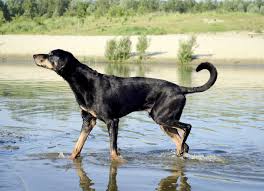
Transylvanian Hound
Conditions of detention
Transylvanian Hounds are adaptable but thrive best in rural or suburban environments where they have plenty of space to roam and exercise. They require a significant amount of physical activity and mental stimulation.
Useful Fact: These dogs excel in homes with large yards or access to open spaces where they can engage in regular exercise, as their hunting background makes them highly energetic.
Nutrition and diet
A balanced diet rich in protein is essential for the Transylvanian Hound to support its active lifestyle. High-quality commercial dog food or a mix of fresh ingredients like meat, vegetables, and grains is recommended.
Useful Fact: Feeding a diet that includes lean meats and high-quality protein sources helps maintain their muscle mass and energy levels, especially given their active nature.
Health
Transylvanian Hounds are generally healthy dogs, but they can be prone to certain genetic conditions such as hip dysplasia and elbow dysplasia. Regular veterinary check-ups are essential to monitor their health.
Useful Fact: Maintaining a healthy weight and providing joint supplements can help prevent and manage orthopedic issues common in active breeds.
Grooming and care
The Transylvanian Hound has a short, dense coat that requires minimal grooming. Regular brushing helps remove loose hair and keep their coat healthy.
Useful Fact: Their low-maintenance coat makes them easy to care for, requiring only occasional baths and regular brushing to maintain cleanliness.
Education and training
Transylvanian Hounds are intelligent and trainable, but they can be independent. Consistent, positive reinforcement methods work best for training.
Useful Fact: Early socialization and obedience training are crucial to manage their strong prey drive and ensure they are well-behaved around people and other animals.
Toys and entertainment
These dogs enjoy toys that challenge their minds and bodies, such as fetch toys, puzzle toys, and interactive games. Engaging in activities like scent work and agility training can be very stimulating for them.
Useful Fact: Providing a variety of toys and regular playtime can prevent boredom and destructive behavior, keeping them mentally and physically active.
Safety
Due to their strong prey drive and high energy levels, Transylvanian Hounds should be kept in a secure area when outdoors. They need to be monitored to prevent them from wandering off or chasing wildlife.
Useful Fact: A well-fenced yard is essential to give them the freedom to roam safely without the risk of escaping
Accessories
Sturdy collars, harnesses, and leashes are important for managing the Transylvanian Hound during training and outdoor activities.
Useful Fact: Using a harness can provide better control and prevent neck strain, especially during walks and training sessions.
Socialization
Transylvanian Hounds are loyal and form strong bonds with their families but can be reserved with strangers. Early and consistent socialization is important to ensure they are comfortable in various environments.
Useful Fact: Introducing them to different people, animals, and settings from a young age helps them become well-adjusted and confident adults.
Travel and Transportation
Transylvanian Hounds can travel well if they are accustomed to it from a young age. Ensuring they have a comfortable and secure space in the vehicle is important.
Useful Fact: Using a travel crate or a harness designed for car travel ensures their safety and comfort during trips.
Behavior and psychology
The Transylvanian Hound is known for its loyalty, intelligence, and strong hunting instincts. They form strong bonds with their families and are naturally protective.
Useful Fact: Understanding their hunting nature and providing proper training can help manage their behavior and ensure they are confident and well-behaved.
Legal aspects
Owners should comply with general dog ownership laws, such as licensing, vaccination requirements, and leash laws.
Useful Fact: In some areas, there may be specific regulations regarding hunting breeds, so checking local laws is important.


